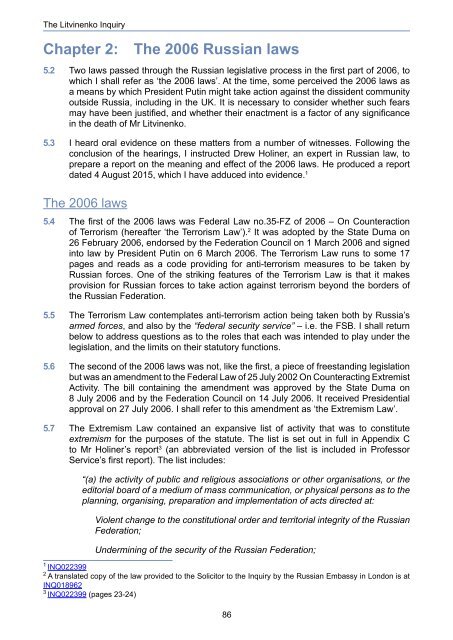The Litvinenko Inquiry
2429870
2429870
Create successful ePaper yourself
Turn your PDF publications into a flip-book with our unique Google optimized e-Paper software.
<strong>The</strong> <strong>Litvinenko</strong> <strong>Inquiry</strong><br />
Chapter 2: <strong>The</strong> 2006 Russian laws<br />
5.2 Two laws passed through the Russian legislative process in the first part of 2006, to<br />
which I shall refer as ‘the 2006 laws’. At the time, some perceived the 2006 laws as<br />
a means by which President Putin might take action against the dissident community<br />
outside Russia, including in the UK. It is necessary to consider whether such fears<br />
may have been justified, and whether their enactment is a factor of any significance<br />
in the death of Mr <strong>Litvinenko</strong>.<br />
5.3 I heard oral evidence on these matters from a number of witnesses. Following the<br />
conclusion of the hearings, I instructed Drew Holiner, an expert in Russian law, to<br />
prepare a report on the meaning and effect of the 2006 laws. He produced a report<br />
dated 4 August 2015, which I have adduced into evidence. 1<br />
<strong>The</strong> 2006 laws<br />
5.4 <strong>The</strong> first of the 2006 laws was Federal Law no.35-FZ of 2006 – On Counteraction<br />
of Terrorism (hereafter ‘the Terrorism Law’). 2 It was adopted by the State Duma on<br />
26 February 2006, endorsed by the Federation Council on 1 March 2006 and signed<br />
into law by President Putin on 6 March 2006. <strong>The</strong> Terrorism Law runs to some 17<br />
pages and reads as a code providing for anti-terrorism measures to be taken by<br />
Russian forces. One of the striking features of the Terrorism Law is that it makes<br />
provision for Russian forces to take action against terrorism beyond the borders of<br />
the Russian Federation.<br />
5.5 <strong>The</strong> Terrorism Law contemplates anti-terrorism action being taken both by Russia’s<br />
armed forces, and also by the “federal security service” – i.e. the FSB. I shall return<br />
below to address questions as to the roles that each was intended to play under the<br />
legislation, and the limits on their statutory functions.<br />
5.6 <strong>The</strong> second of the 2006 laws was not, like the first, a piece of freestanding legislation<br />
but was an amendment to the Federal Law of 25 July 2002 On Counteracting Extremist<br />
Activity. <strong>The</strong> bill containing the amendment was approved by the State Duma on<br />
8 July 2006 and by the Federation Council on 14 July 2006. It received Presidential<br />
approval on 27 July 2006. I shall refer to this amendment as ‘the Extremism Law’.<br />
5.7 <strong>The</strong> Extremism Law contained an expansive list of activity that was to constitute<br />
extremism for the purposes of the statute. <strong>The</strong> list is set out in full in Appendix C<br />
to Mr Holiner’s report 3 (an abbreviated version of the list is included in Professor<br />
Service’s first report). <strong>The</strong> list includes:<br />
“(a) the activity of public and religious associations or other organisations, or the<br />
editorial board of a medium of mass communication, or physical persons as to the<br />
planning, organising, preparation and implementation of acts directed at:<br />
Violent change to the constitutional order and territorial integrity of the Russian<br />
Federation;<br />
Undermining of the security of the Russian Federation;<br />
1<br />
INQ022399<br />
2<br />
A translated copy of the law provided to the Solicitor to the <strong>Inquiry</strong> by the Russian Embassy in London is at<br />
INQ018962<br />
3<br />
INQ022399 (pages 23-24)<br />
86


